What Nuts Are Good For Diabetes? 7 Best Nuts To Try In 2024
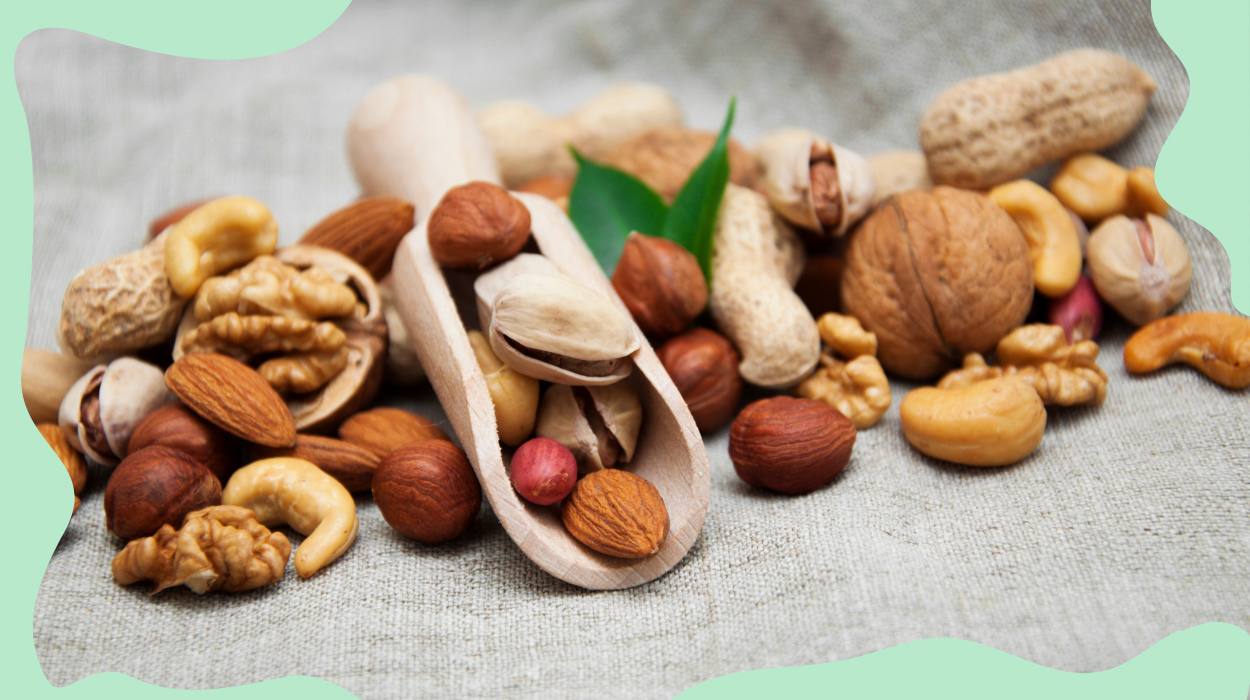
As you navigate life with diabetes, you may go through a revolving door of different diets to get your best health results. With recent trends, there is a large focus on low carbohydrate diets and carb counting, as carbs may raise blood glucose levels.[1] However, it is important to have an adequate balance of the food groups to maximize the health benefits[2] of these nutrients and improve health outcomes.
For people with diabetes,[3] this would mean a balance of carbohydrates, protein, and fats. Some carb sources, like low-starch vegetables and some fruits like berries, are lower-carb choices that provide great fiber. This may include protein from protein powder sources that also contain ingredients to help you meet daily energy requirements.
Looking at healthy sources of fats, we’ll discuss what nuts are good for diabetes.[4] Having a handful each day or topping your oatmeal or smoothie off with nuts can make a difference in your overall wellness.
7 Best Nuts For Diabetes To Try
- Pistachios.
- Almonds.
- Brazil Nuts.
- Walnuts.
- Cashews.
- Peanuts.
- Hazelnuts.
Are Nuts Good For Diabetes?
Eating nuts can be beneficial because they are nutrient-dense,[5] contain healthy fats, and provide more substantial satiety. The fiber and protein content allows you to feel full longer while helping you to regulate blood sugar. Feeling full for a longer time can suppress your appetite, which may prevent overeating and weight gain.
It is beneficial to eat various nuts[6] because they contain healthy fats, monounsaturated and polyunsaturated fats which contain anti-inflammatory properties. Not only do nuts provide great protein and fiber content, but they also supply minerals like magnesium, vitamins such as thiamine and folate, and antioxidants. These nutrients that work on oxidative stress are helpful in ameliorating chronic conditions[6] like metabolic syndrome, hyperglycemia, and insulin resistance.
Full Of Minerals And Healthy Phytonutrients
Additionally, nuts are chock full of minerals, flavonoids, and phytonutrients that alleviate triglycerides, cholesterol, and blood pressure. These benefits for metabolic markers can ameliorate the complications and co-morbidities often seen in these disorders. This includes decreasing hypertension and cancer risk by topping your shrimp stir-fry with a few nuts.
Unsaturated Fats
Nuts are great sources of unsaturated fats that protect cellular function[7] and heart health. When discussing nuts and their role in diabetes management, a major area of focus[5] is the ability to reduce the risk of heart disease in people with diabetes. A large part of this is the beneficial influence on good and bad cholesterol.
7 Best Nuts For Diabetes
The following seven unsalted nuts are considered some of the best nuts for diabetes; they are full of healthy fats, making them great options for a healthy snack.
Pistachios
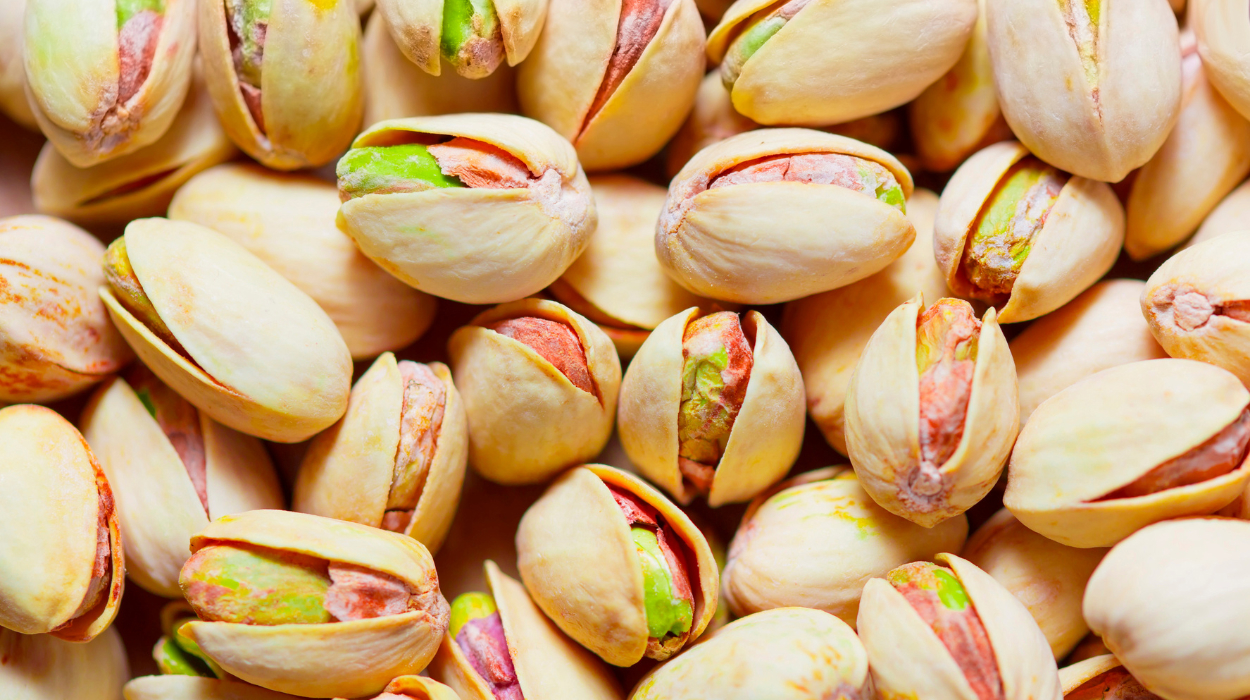
If you’ve been hesitant about nuts and ask, “Do nuts raise blood sugar?” you’ll be glad to learn about the pistachio nut! Having 40 grams of pistachios daily, the equivalent of 1.3 ounces or ⅜ cup, can adequately decrease fasting glucose[6] in those with diabetes and decrease low-density lipoprotein, one of the cardiovascular risk factors. Blood pressure and triglycerides also can be decreased.
Pistachios also lowered levels of c-reactive protein,[8] an inflammatory marker. Eating pistachio nuts can help you control factors like blood sugar, weight, inflammation, and lipid markers related to human health conditions like metabolic syndrome and diabetes.
Almonds

Almonds are a great choice if you need to regulate blood sugar levels. Whether it’s a serving of ten grams or 100 grams, almonds[6] positively influence blood glucose levels after meals and can help with glycemic control. Another pro is the fiber content that encourages satiety is advantageous for preventing weight gain.
The improvement in lipids[9] makes this nut an effective choice for individuals unable or unwilling to take statins. The decreases in non-HDL cholesterol can be protective against blocked arteries. The improved lipid homeostasis and positive impact on weight make almonds a great snack for individuals with cardiovascular risk factors.
Brazil Nuts
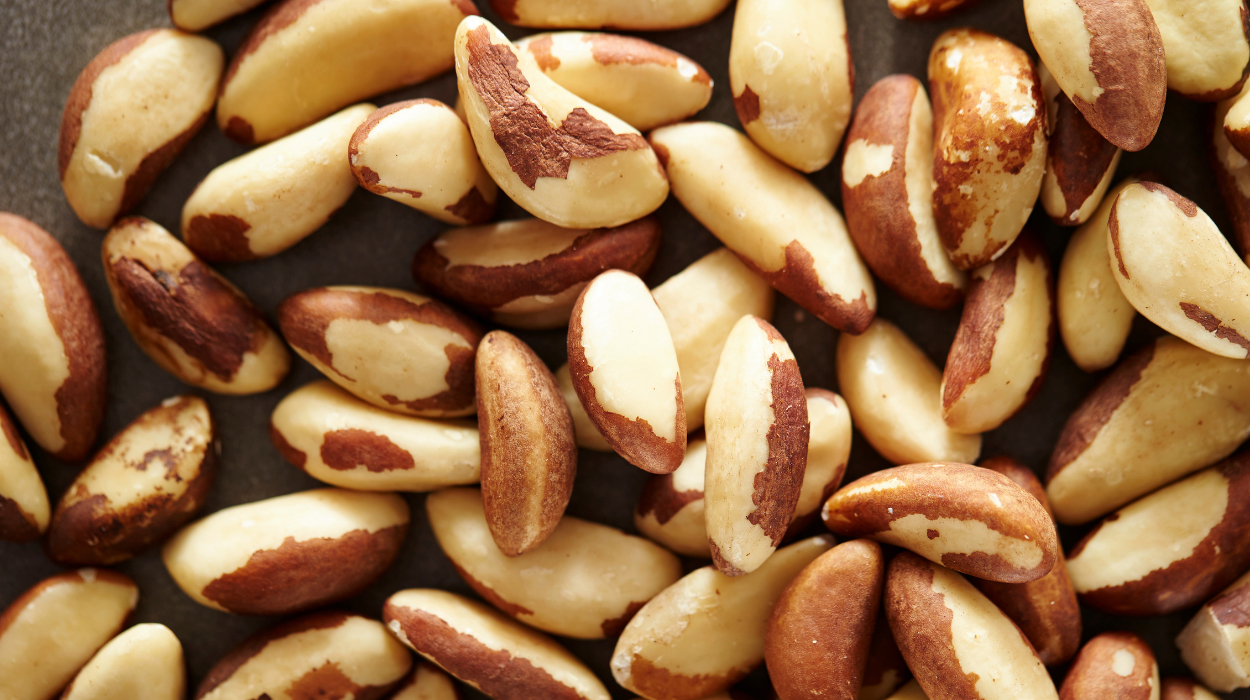
Brazil nuts are good nuts for those with diabetes[10] because of their antioxidant content. These nuts contain the greatest amount of selenium, which helps with glutathione peroxidase activity, particularly in individuals with hypertension and dyslipidemia. This is a great asset for alleviating oxidative stress and inflammation.
Combatting oxidative damage is essential because reactive oxygen species are seen in many physiological conditions, particularly atherosclerosis. Oxidative stress is linked to diabetes, hypertension, and hyperlipidemia, all of which can be seen in metabolic syndrome and can be associated with heart disease.
Walnuts
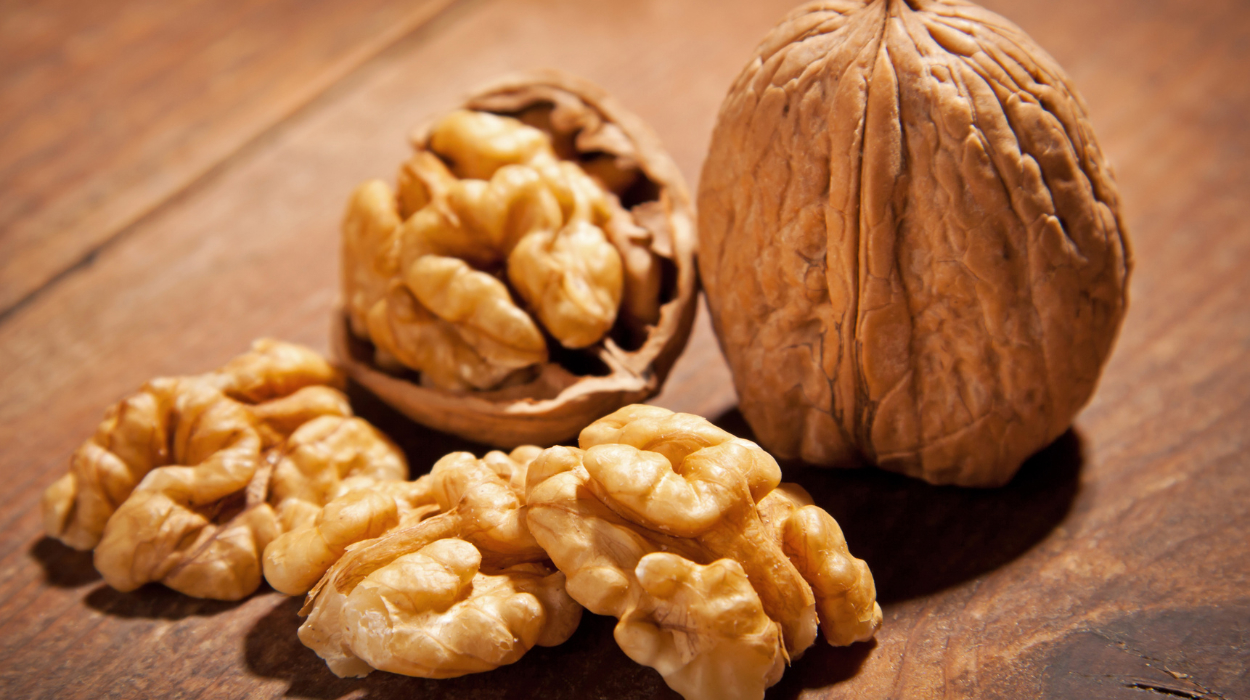
If you want to add a few nuts to your diet, you may want to grab a handful of walnuts or add them to your salad. Decreases in the prevalence of diabetes diagnosis,[11] self-reports of fasting, and HbA1C glucose levels were observed in individuals who ate walnuts. This was observed in individuals affected by relevant metabolic markers, including those with diabetes, metabolic syndrome, or polycystic ovary syndrome.
Nut consumption is vital in individuals aiming to prevent diabetes and for individuals looking to manage the condition. Eating walnuts has assisted in controlling blood sugar in type 2 diabetes. Additionally, the average daily blood sugar was lowered, and in some cases, the daily dose needed for insulin was also lowered.
Cashews
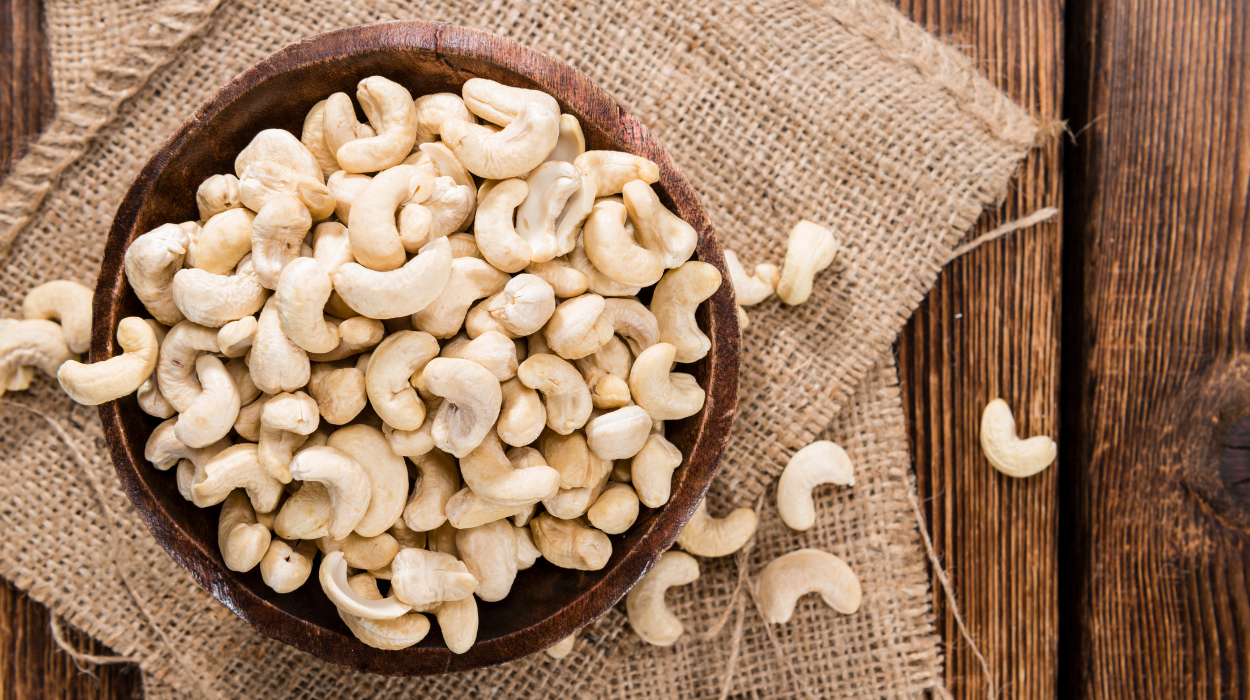
A major asset regarding cashews is their role in heart health and their ability to reduce[12] low-density lipoprotein or LDL cholesterol levels. Additionally, a research study showed that blood pressure was reduced[13] in individuals with type 2 diabetes, and high-density lipoprotein or HDL cholesterol was increased. HDL cholesterol[14] is beneficial because it clears other cholesterol from the bloodstream so it cannot form plaques on the artery walls.
With improved HDL and reduced LDL levels, the risk of heart disease is reduced. Another benefit is the possible thermogenic effects[13] of the monounsaturated and polyunsaturated fats provided by cashews which may help boost your metabolism and calories burned.
In addition, cashew consumption hasn’t been shown to cause excessive weight gain or increases in BMI and waist circumference. This makes it advantageous in obesity-related conditions[13] like cardiovascular disease and diabetes.
Peanuts

As you navigate diabetes and nuts,[6] you may want to look closely at the peanut. Having up to 75 grams of peanuts, about ½ cup daily within three weeks, can improve the control of your glycemic response. Additionally, you’ll feel full for longer, and the possible thermogenic effects may enhance your metabolism, protecting against weight gain.
Adding peanuts to your breakfast in the morning can lower your glycemic response[6] after eating a meal. This may be due to the fat released from the peanut and the cleavage of the cell walls when the peanut is processed in the ground roasted form. This can help to lower the glycemic response, lower blood sugar levels, and diminish the risk of diabetes.
Hazelnuts
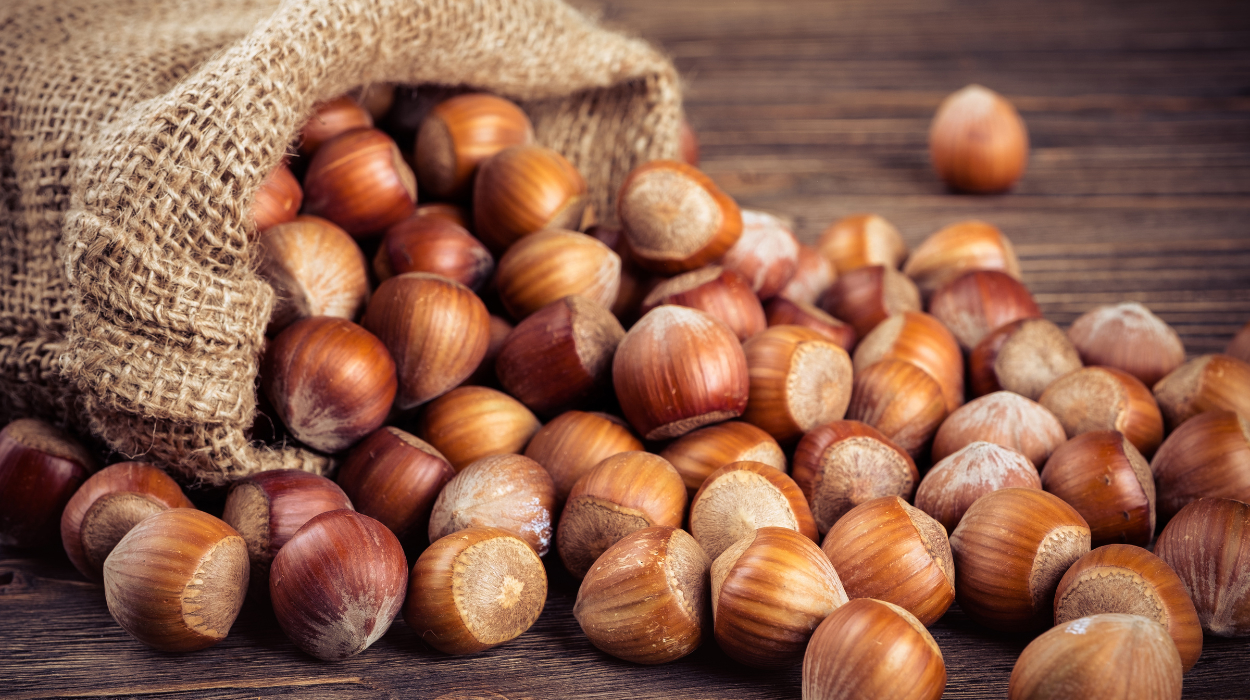
Other nuts good for those with diabetes[15] include hazelnuts, as they also improve blood lipids. The effects it shows on c-reactive protein and the lack of weight gain can make hazelnut suitable for obesity and inflammation-related disorders.
Hazelnuts contain α-tocopherol, a form of vitamin E that boosts its antioxidant and immunomodulating[16] profile. Adding hazelnuts to the diet is beneficial for relieving oxidative stress and preventing DNA damage. Hazelnuts are also useful for lowering arterial pressure,[16] a major hallmark in hypertension and developing heart disease.
The Bottom Line
Mix your dietary habits up with a variety of nuts! Nuts do not offer a great amount of available carbs, so when they are added to high-carb meals, there may be a reduction[4] in the meal’s glycemic index. This leads to decreased glycemic responses after eating and decreased gastric emptying, which makes you feel satiated.
Aside from nuts, focus on adding some berries and dark leafy greens to your diet when you consider food for diabetes. These superfoods will modulate blood pressure and the immune system. Consider supplements like a vitamin to boost the nutritional profile of your diet, as nutrient deficiencies often mark diabetes. Focus on using unsalted instead of salted nuts to keep your daily sodium intake below 2,300 mg[17] daily.
Keep these components in mind as you meal plan as well. Whether you prepare all your meals or utilize delivery services, look into the glycemic index of the food products. Give close focus to low-carb sources and adequate fiber, as well as the quality of protein and the presence of healthy fats.
Regardless of your dietary style, prioritize the components that will help manage blood sugar and prevent spikes. This includes nuts, which can give crunchy character to your meals while reducing insulin resistance and inflammation.
+ 17 sources
Health Canal avoids using tertiary references. We have strict sourcing guidelines and rely on peer-reviewed studies, academic researches from medical associations and institutions. To ensure the accuracy of articles in Health Canal, you can read more about the editorial process here
- Kelly, T., Unwin, D.M. and Finucane, F.M. (2020). Low-Carbohydrate Diets in the Management of Obesity and Type 2 Diabetes: A Review from Clinicians Using the Approach in Practice. [online] 17(7), pp.2557–2557. doi:https://doi.org/10.3390/ijerph17072557.
- Martín-Peláez, S., Montserrat Fitó and Castañer, O. (2020). Mediterranean Diet Effects on Type 2 Diabetes Prevention, Disease Progression, and Related Mechanisms. A Review. [online] 12(8), pp.2236–2236. doi:https://doi.org/10.3390/nu12082236.
- Mayo Clinic. (2022). Diabetes management: How lifestyle, daily routine affect blood sugar. [online] Available at: https://www.mayoclinic.org/diseases-conditions/diabetes/in-depth/diabetes-management/art-20047963
- Nishi, S.K., Viguiliouk, E., Cyril, David J.A. Jenkins, Hu, F.B., Sievenpiper, J.L., Alessandro Atzeni, Misra, A. and Jordi Salas-Salvadó (2023). Nuts in the Prevention and Management of Type 2 Diabetes. [online] 15(4), pp.878–878. doi:https://doi.org/10.3390/nu15040878.
- Digestive Health Team (2019). A Diet Tip for People With Type 2 Diabetes: Eat More Nuts. [online] Cleveland Clinic. Available at: https://health.clevelandclinic.org/a-diet-tip-for-people-with-type-2-diabetes-eat-more-nuts/
- Machado, G., Raquel Machado Schincaglia, Pimentel, G.D. and João Felipe Mota (2017). Nuts and Human Health Outcomes: A Systematic Review. [online] 9(12), pp.1311–1311. doi:https://doi.org/10.3390/nu9121311.
- www.heart.org. (2021). Dietary Fats. [online] Available at: https://www.heart.org/en/healthy-living/healthy-eating/eat-smart/fats/dietary-fats
- Parham, M., Heidari, S., Ashraf Khorramirad, Hozoori, M., Hosseinzadeh, F., L Bakhtyari and Jamshid Vafaeimanesh (2014). Effects of Pistachio Nut Supplementation on Blood Glucose in Patients with Type 2 Diabetes: A Randomized Crossover Trial. [online] 11(2), pp.190–196. doi:https://doi.org/10.1900/rds.2014.11.190.
- Ruisinger, J.F., Gibson, C.A., Backes, J.M., Bryan Ronain Smith, Sullivan, D.K., Moriarty, P. and Kris-Etherton, P.M. (2015). Statins and almonds to lower lipoproteins (the STALL Study). [online] 9(1), pp.58–64. doi:https://doi.org/10.1016/j.jacl.2014.10.001.
- Vilas, G., Moraes, M., Seixas, A., Saint’Pierre, T.D., Rodrigo Franco Gonçalves, Pinheiro-Mulder, A., Anderson Junger Teodoro, Ronir Raggio Luiz and Rosa, G. (2015). Improvement of antioxidant status after Brazil nut intake in hypertensive and dyslipidemic subjects. [online] 14(1). doi:https://doi.org/10.1186/s12937-015-0043-y.
- Arab, L., Dhaliwal, S.K., Martin, C.E., Larios, A.D., Jackson, N. and Elashoff, D. (2018). Association between walnut consumption and diabetes risk in NHANES. [online] 34(7), pp.e3031–e3031. doi:https://doi.org/10.1002/dmrr.3031.
- Mah, E., Schulz, J.A., Kaden, V.N., Lawless, A.L., Rotor, J., Mantilla, L.B. and Liska, D. (2017). Cashew consumption reduces total and LDL cholesterol: a randomized, crossover, controlled-feeding trial. [online] 105(5), pp.1070–1078. doi:https://doi.org/10.3945/ajcn.116.150037.
- Mohan, V., Gayathri, R., Jaacks, L.M., Lakshmipriya, N., Anjana, R.M., Spiegelman, D., Jeevan, R.G., Balasubramaniam, K.K., Shobana, S., Jayanthan, M., Gopinath, V., Divya, S., Kavitha, V., Vijayalakshmi, P., Bai R, M.R., Unnikrishnan, R., Sudha, V., Krishnaswamy, K., Salas-Salvadó, J. and Willett, W.C. (2018). Cashew Nut Consumption Increases HDL Cholesterol and Reduces Systolic Blood Pressure in Asian Indians with Type 2 Diabetes: A 12-Week Randomized Controlled Trial. The Journal of Nutrition, [online] 148(1), pp.63–69. doi:https://doi.org/10.1093/jn/nxx001.
- Mayo Clinic. (2022). HDL cholesterol: How to boost your ‘good’ cholesterol. [online] Available at: https://www.mayoclinic.org/diseases-conditions/high-blood-cholesterol/in-depth/hdl-cholesterol/art-20046388
- Siew Ling Tey, Gray, A.R., Chisholm, A., Delahunty, C.M. and Brown, R. (2013). The Dose of Hazelnuts Influences Acceptance and Diet Quality but Not Inflammatory Markers and Body Composition in Overweight and Obese Individuals. [online] 143(8), pp.1254–1262. doi:https://doi.org/10.3945/jn.113.174714.
- Rávila Marques Souza, Aline Pimentel Gomes, Margareth, M. and João Felipe Mota (2015). Nuts and legume seeds for cardiovascular risk reduction: scientific evidence and mechanisms of action. [online] 73(6), pp.335–347. doi:https://doi.org/10.1093/nutrit/nuu008.
- Center (2022). Sodium in Your Diet. [online] U.S. Food and Drug Administration. Available at: https://www.fda.gov/food/nutrition-education-resources-materials/sodium-your-diet



